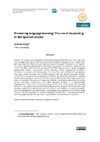Identificador persistente para citar o vincular este elemento:
https://accedacris.ulpgc.es/jspui/handle/10553/70341
| Título: | Promoting language learning: The use of mLearning in the Spanish classes | Autores/as: | Mejía, Glenda | Clasificación UNESCO: | 570107 Lengua y literatura 550510 Filología |
Palabras clave: | Spanish learning mLearning Smartphones Oral skills Aprendizaje del español, et al. |
Fecha de publicación: | 2016 | Publicación seriada: | LFE. Revista de Lenguas para Fines Específicos | Resumen: | The aim of this study is to investigate the benefits of integrating Mobile Learning (mLearning)
into language teaching activities to promote active student engagement and independent
learning. A total of 72 beginner level students of Spanish (European Framework: A1.1 (Spanish
1) and A1.2 (Spanish 2) participated in this study. This project was undertaken between Sem
II 2014 and Sem I 2015 with the participation of RMIT students from a variety of degree
backgrounds: Media, International studies, Business, Music, Engineering, Animation,
Education, Social Work and Photography. The study took into consideration pedagogical
principles, mobile principles, and blended methods, and the learning outcomes of each
course: RMIT graduate attributes were also considered. As part of their assessment students
were asked to produce a socio-cultural video using mobile phones, iPads, video cameras or
other such devices. The practice of employing methods of qualitative data collection (on-line
survey, interviews, observations and video samples) resulted in a demonstrable
improvement in oral skills, vocabulary and grammar, while at the same time allowing
students to be creative with the use of technological devices. Based on the results, this study
provides insights into students’ and teachers’ views on the benefits of using mLearning for
Spanish language learning. Unfortunately, their feedback was negative in terms of technology
support from the University. It is, however hoped that the findings of the study will motivate
other language educators to use mLearning activities to evaluate learners’ oral skills. Este estudio tiene como objetivo investigar los beneficios de la integración de Mobile Learning (mLearning) en actividades de enseñanza de idiomas con la intención de promover la participación activa del alumno y su aprendizaje independiente. Un total de 72 estudiantes de español de nivel principiante (Marco europeo: A1.1 (español 1) y A1.2 (español 2)) participaron en este estudio. Este proyecto se llevó a cabo entre el primer semestre 2014 y el segundo semestre 2015, con la participación de estudiantes de la Universidad de RMIT de distintos programas: medios de comunicación, estudios internacionales, negocios, ingeniería, música, animación, educación, trabajo social y fotografía. El estudio tomó en cuenta los principios pedagógicos y los principios metodológicos del uso de los móviles. Los objetivos de aprendizaje de cada curso y los atributos de graduación de RMIT también fueron considerados. Como parte de la evaluación se pidió a los estudiantes que produjeran un vídeo de contenido socio-cultural utilizando dispositivos electrónicos como teléfonos móviles, iPads, cámaras de video. Los datos para el presente estudio se obtuvieron por medio de métodos de recolección de datos cualitativos (encuesta on-line, entrevistas, observaciones y muestras de vídeo). Los resultados mostraron una mejora en las habilidades orales, el vocabulario y la gramática de los estudiantes, al mismo tiempo que se les permite desarrollar su creatividad con el uso de dispositivos tecnológicos. En base a los resultados, este estudio aporta una visión de las opiniones de los alumnos y de los profesores sobre las ventajas de usar mLearning durante el aprendizaje del español. Lamentablemente, sus comentarios han sido negativos en lo que respecta al del soporte tecnológico de la Universidad. Por último, se espera que los hallazgos de este estudio motiven a otros educadores de idiomas a utilizar actividades de mLearning para evaluar las habilidades orales de los alumnos. |
URI: | https://accedacris.ulpgc.es/handle/10553/70341 | ISSN: | 1133-1127 | DOI: | 10.20420/rlfe.2016.0091 | Fuente: | LFE. Revista de lenguas para fines específicos [eISSN 2340-8561], v. 22 (1), p. 80-99 |
| Colección: | Artículos |
Citas de WEB OF SCIENCETM
Citations
7
actualizado el 12-ene-2026
Visitas
27
actualizado el 11-ene-2026
Descargas
49
actualizado el 11-ene-2026
Google ScholarTM
Verifica
Altmetric
Comparte
Exporta metadatos
Los elementos en ULPGC accedaCRIS están protegidos por derechos de autor con todos los derechos reservados, a menos que se indique lo contrario.
